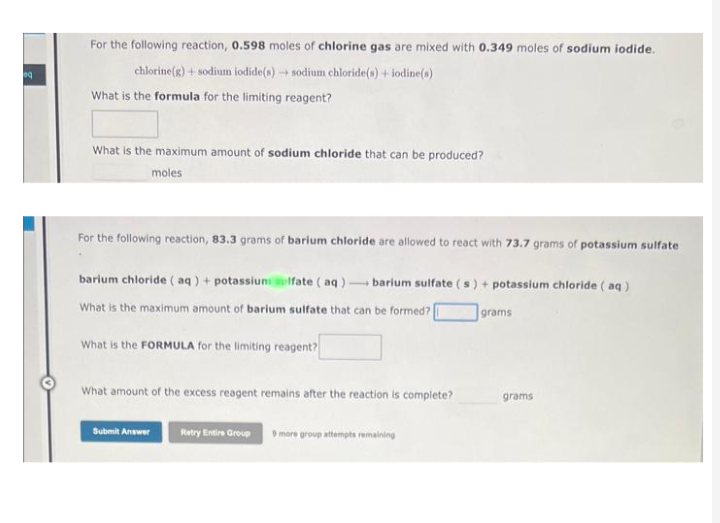chlorine(g) + sodium iodide(s) sodium chloride(s) + lodine(s) What is the formula for the limiting reagent? What is the maximum amount of sodium chloride that can be produced? moles For the following reaction, 83.3 grams of barium chloride are allowed to react with 73.7 grams of potassium sulfate barium chloride ( aq) + potassiunlfate ( aq) - barium sulfate (s) + potassium chloride ( aq) What is the maximum amount of barium sulfate that can be formed? grams What is the FORMULA for the limiting reagent? What amount of the excess reagent remains after the reaction is complete? grams Retry Eintire Group more group attempts remaining Submit Anewer
chlorine(g) + sodium iodide(s) sodium chloride(s) + lodine(s) What is the formula for the limiting reagent? What is the maximum amount of sodium chloride that can be produced? moles For the following reaction, 83.3 grams of barium chloride are allowed to react with 73.7 grams of potassium sulfate barium chloride ( aq) + potassiunlfate ( aq) - barium sulfate (s) + potassium chloride ( aq) What is the maximum amount of barium sulfate that can be formed? grams What is the FORMULA for the limiting reagent? What amount of the excess reagent remains after the reaction is complete? grams Retry Eintire Group more group attempts remaining Submit Anewer
World of Chemistry, 3rd edition
3rd Edition
ISBN:9781133109655
Author:Steven S. Zumdahl, Susan L. Zumdahl, Donald J. DeCoste
Publisher:Steven S. Zumdahl, Susan L. Zumdahl, Donald J. DeCoste
Chapter9: Chemical Quantities
Section: Chapter Questions
Problem 50A
Related questions
Question

Transcribed Image Text:For the following reaction, 0.598 moles of chlorine gas are mixed with 0.349 moles of sodium iodide.
chlorine(r) + sodium iodide(s) → sodium chloride(s) + iodine(s)
What is the formula for the limiting reagent?
What is the maximum amount of sodium chloride that can be produced?
moles
For the following reaction, 83.3 grams of barium chloride are allowed to react with 73.7 grams of potassium sulfate
barium chloride ( aq ) + potassiuntfate ( aq)barium sulfate ( s) + potassium chloride ( aq )
What is the maximum amount of barium sulfate that can be formed?[
grams
What is the FORMULA for the limiting reagent?
What amount of the excess reagent remains after the reaction is complete?
grams
Retry Entire Group more group attempts remaining
Bubmit Anawer
Expert Solution
This question has been solved!
Explore an expertly crafted, step-by-step solution for a thorough understanding of key concepts.
This is a popular solution!
Trending now
This is a popular solution!
Step by step
Solved in 3 steps with 3 images

Knowledge Booster
Learn more about
Need a deep-dive on the concept behind this application? Look no further. Learn more about this topic, chemistry and related others by exploring similar questions and additional content below.Recommended textbooks for you

World of Chemistry, 3rd edition
Chemistry
ISBN:
9781133109655
Author:
Steven S. Zumdahl, Susan L. Zumdahl, Donald J. DeCoste
Publisher:
Brooks / Cole / Cengage Learning

World of Chemistry
Chemistry
ISBN:
9780618562763
Author:
Steven S. Zumdahl
Publisher:
Houghton Mifflin College Div

Chemistry: The Molecular Science
Chemistry
ISBN:
9781285199047
Author:
John W. Moore, Conrad L. Stanitski
Publisher:
Cengage Learning

World of Chemistry, 3rd edition
Chemistry
ISBN:
9781133109655
Author:
Steven S. Zumdahl, Susan L. Zumdahl, Donald J. DeCoste
Publisher:
Brooks / Cole / Cengage Learning

World of Chemistry
Chemistry
ISBN:
9780618562763
Author:
Steven S. Zumdahl
Publisher:
Houghton Mifflin College Div

Chemistry: The Molecular Science
Chemistry
ISBN:
9781285199047
Author:
John W. Moore, Conrad L. Stanitski
Publisher:
Cengage Learning

Chemistry for Engineering Students
Chemistry
ISBN:
9781337398909
Author:
Lawrence S. Brown, Tom Holme
Publisher:
Cengage Learning


Chemistry: An Atoms First Approach
Chemistry
ISBN:
9781305079243
Author:
Steven S. Zumdahl, Susan A. Zumdahl
Publisher:
Cengage Learning